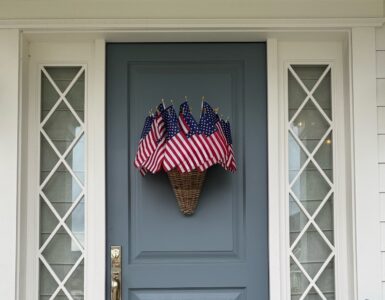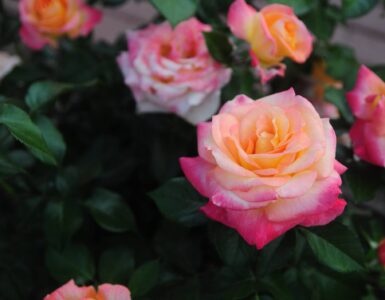Studio 5 Contributor and Utah State University Consumer Educator, Teresa Hunsaker says a few basic cleaners are all you need to keep your home clean. Find out which ones to keep and which ones to toss.
You’ve been down the household cleaner isles at the grocery stores, super stores, or the home centers, they have an almost never ending array of cleaners. But are they all necessary? How do we decide which ones to choose?
While it may be close to impossible to make a cleaning supply list that fits every household’s needs, there are some things that are pretty universal to most cleaning situations and homes—so we don’t need to buy every new cleaner that comes along, thus simplifying the storage shelves and saving on the budget. Admittedly all these cleaners take up space and add to the family expenses. One last reason to consider simplifying and returning to some basics: environment.
All Purpose Cleaner
In my opinion every home should have one good all purpose cleaner. The intent of the all purpose cleaner is to be able to clean most surfaces and tackle many tasks. While they have their limitations, a good one will serve many different functions in cleaning. They can clean floors in damp mopping, they can clean walls and counters and they can clean cupboard shelves and wash windows. The trick in their use may be in the strength and cleaning rag or scrubber, as well as the rinse. I have even been known to use them on a laundry stain or two.
My favorites: Greased Lightening, Simple Green, Seventh Generation Free and Clear, Lysol All Purpose Cleaner, Fantastik Orange Action, and 409.
Note: It is possible to make your own with a few of our other basics mixed with water.
Soft Scrubbing Cleanser
It is possible to make your own scrubbing cleanser, and they work pretty well, but for a few cents extra it is nice to have one handy and ready to go for those tough spots and stains on porcelain, some tile, and even on pots and pans.
Dish Detergent
Dish detergent is a basic staple in any cleaning cupboard. It can be used to clean many surfaces and lift many stains.
Favorites: Dawn Liquid Hand Dish Detergent, Palmolive, and Ivory—especially the formulas for de-greasing.
Vinegar
Vinegar is a great addition to a cleaning cupboard. Because of its acidity it is also a pretty good disinfectant and mold inhibitor. Use it to dissolve mineral deposits, grease, remove traces of soap, remove mildew or wax buildup, polish some metals, and deodorize. Vinegar can clean brick or stone, and is an ingredient in some natural carpet cleaning recipes. Use it with baking soda to clean a toilet bowl, mix it with salt to clean a tub. For a hundred other uses, go to www.vinegartips.com. It is amazing how many things it works for.
Lemon
Like vinegar, lemon juice has many options for adding your cleaning arsenal. In fact, many of the same uses for vinegar can be interchanged with lemon. No all, but many. Remember, nothing acidic on marble!
Lemon juice can be used to dissolve soap scum and hard water deposits. Lemon is a great substance to clean and shine brass and copper. Lemon juice can be mixed with vinegar and or baking soda to make cleaning pastes. Cut a lemon in half and sprinkle baking soda on the cut section. Use the lemon to scrub dishes, surfaces, and stains. Mix 1 cup olive oil with ½ cup lemon juice and you have a furniture polish for your hardwood furniture.
Borax
Borax is a naturally occurring mineral, soluble in water. It can deodorize, inhibit the growth of mildew and mold, boost the cleaning power of soap or detergent, remove stains, and can be used with attractants such as sugar to kill cockroaches. One great use for borax is to kill odor producing mold and bacteria in garbage cans: sprinkle 1/2 cup Borax in the bottom of the garbage can.
Note: Borax is toxic if ingested.
Rubbing Alcohol or Isopropyl Alcohol
This is an excellent disinfectant. Used for cleaning electronic devices such as contact pins (like those on ROM cartridges), magnetic tape deck and floppy disk drive heads, the lenses of lasers in optical disc drives (e.g. CD, DVD) and removing thermal paste from CPUs. It is also used to clean LCD and glass computer monitor screens (at some risk to the anti-reflection coating of the screen), and used by many music shops to give second-hand or worn records newer looking sheens. It cleans dry-erase boards very well and other unwanted ink related marks. Don’t buy special cleaners to get out baby formula stains, use a little isopropyl alcohol on the stain, then a regular detergent worked in. Works like a charm. Use an alcohol (isopropyl)/water solution for cleaning mirrors or chrome: 1 part alcohol to 4 parts water.
There are two other cleaning agents you might also consider as part of your basic cleaning supplies: bleach and ammonia—but NEVER mixed together. There are certainly some drawbacks to both of these, but they also have their advantages too, if used wisely and carefully.
Many of our homes have “special” surfaces (travertine, marble, stainless steel, solid surface counters, brass, and chrome) that we may need to be sure we know how to properly care for—but even many of these surfaces can be cared for with at least one or two of the above products. While there may be “special” cleaners to go with these “special” surfaces, checking to see if other options will do can save you some cash and some cupboard space.
If you have any questions, contact Teresa Hunsaker at the Family and Consumer Science Education Department at the Weber County USU Extension office at (801) 399-8203 or online at www.extension.usu.edu/weber















Add comment